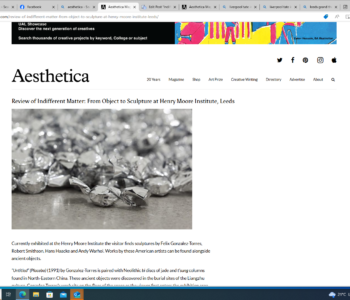 Articles
Articles
Festival of Britten. Peter Grimes. Opera North.
A tragedy of madness, hypocrisy, scapegoating and the claustrophobia of psychological repression. These elements were present with great force and deep impact on Saturday as Opera North opened its Festival of Britten with Peter Grimes. Such factors were to be found, of course, in the narrative; and in the chromatically shifting modal scheme with occasional shafts of bright, diatonic relief. However, the production design (Anthony Ward) in tandem with Phyllida Lloyd’s direction conveyed the same with oppressively bare austerity.
A large fishing net suspended from above and held open engulfed the chorus. Thus enclosed, ‘the borough’ were lent an amorphous mob identity at times devoid of individual difference. The local society surrounding the protagonist was to be seen as Grimes saw them. The repression imparted through Britten’s score compounded the up-tight, claustrophobic veneer of respectability that made this chorus in character a powderkeg. Where the net also tapped into the maritine context, the backdrop, which extended to the sides and corners of the set, depicted a greyish seascape, threatening with its blandness. An ingenious employment of duckboards allowed formal delineations to take shape when Aunty’s pub or the kangaroo court was in focus.
Jeffrey Lloyd-Roberts’ Grimes convinced of the complexity of the character with great verve. An analysis of his portrayal of Grimes in which acting performance and vocal proficiency are regarded separately would seem redundant: the two were seamless. It is an excellent casting. Here, his Grimes came across with an abiding innocence that is contorted into a false cynicism by the burning flames of lower middle class condemnation. The essence of this beleaguered purity was transmitted best by Lloyd-Roberts in Grimes’ aria ‘The Great Bear and Plaiedes’. Grimes’ desire to achieve great wealth and respectability was conveyed with that same innocence and false cynicism by the purity of Lloyd-Roberts’ instrument. Such was compounded further by the apparent contrary nature of his frame, which is considerable. Laudable for its terrifying audacity was the moment when Grimes holds the dead apprentice aloft. Grime’s ‘mad scene’ was as disturbing as could have been intended. Lloyd-Roberts convinced of mental crisis. The pitfall resisted well was unintended comedy: no mean achievement.
High praise is due to Robert Hayward. His Captain Balstrode imparted measured maturity. His control and sonority – very exacting – conveyed the well-roundedness of the character to an impression of genuine masculinity. Where the character’s humanity toward Grimes amounted to the individual ability to think independently of a crowd, Hayward’s interpretation was a model of charisma.
Hypocritical, zealous accusation and gossip were at times comic in the interpretations of Mark Le Brocq (Bob Boles) and Rebecca de Pont Davies (Mrs. Sedley). Whether intended or not, these occasional forays into levity supplied a degree of relief and introduced an extra facet of the mundane with which to compare the overall tragedy. This lent perspective and threw light upon the degree to which apprently harmless gossip and rumour can be injurious.
Giselle Allen’s Ellen Orford spoke of great humanity both vocally and in acting performance. Maternal and uxorial profundity flooded the auditorium. From honeyed depths to heartfelt and deploring resistence against castigation the impression was convincing. Perhaps Allen’s most engaging moment was during the Septet: on the repeated phrase ‘Hard hearts!’ I became swathed in a layer of goosebumps.Britten’s score was conveyed here, particularly by Allen, with upmost sense of tragedy. Indeed, all of the ensemble work, which is at times very difficult to execute with an overall aural impression of regulation, was a marvel of concerted spruceness. The piece ‘Old Joe has gone fishing’ was performed with an unexpected lightness. The temptation for the performer to oversing in this piece in order to mark separate passages rhythmically was not detectable.
The only negative, with the exceptions of Lloyd-Roberts and Hayward, was lapses in clarity of diction. Meaning was sometimes lost by principals and chorus. This was not an issue of balance. The opera is firm in the repertoire, but there will always be newcomers to an Opera North audience. One of their great strengths is the broadening of access to the tradition. Demanding, and, at times, counter-intuitive music such as this may result in such lapses. The danger for the newcomer to the audience is confusion in respect of the narrative. It might have been better to employ the televisual display screens used for the translations of non-English libretti.
The most irksome moment preceded choral catharsis. When mob rule ensues, imflamed by mounting gossip and rumour, raw savagery breaks out. In this production a very weird and well-crafted effigy of Grimes is brandished above the mob. Where the chorus reach their climax, the blood runs cold with apprehension. Moments of fine tenderness and vulnerability are experienced alongside such burning fury.

